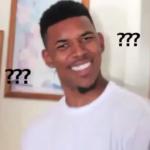Yeah, speaking of "moeilijk"... I do not know for sure where it comes from, but I think it's a shortening from 'vermoeilijk' derrived from the verb "vermoeien" which means "making tired" or "exhaust", so that the context would be that if something is difficult it exhausts you... "moe" means "tired" in Dutch...
When it comes to Finnish, it is part of a language group where also some languages spoken in former Soviet Republics come from, however I believe those languages were banned by the Soviet regime back in the time, and although they are spoken again, heavily influenced by the Russian language, and Finland, however a former part of Russia, was already a separate country when the Soviet Union was founded, and thus the Finnish language could remain a bit more "pure", I think... Just a speculation, as I really don't know... Some Dutch people already complain when they got to learn German about the 4 cases (turning "der" to "des", "dem" and "den" depending on the case), and my teacher scared them by telling Finnish has approx 28 cases (if not more... I believe Latin has 8).
And yeah, the first time I came to Germany, was actually on my way to Yugoslavia (which still was a country back then), and I could partially understand German signs too by relating to Dutch. I immediately knew that "Bleifrei" meant "free of lead" or "unleaded" (in Dutch "loodvrij"), but it being written on all patrol stations at the time, made it obvious... I mean I also came in France a lot and I found out pretty quickly that in French it's "Sans plomb" (literally "without lead")... Sometimes it's also looking in the context the word is used in, I guess... ;)
Some people who knew German felt like reading a misspelled German text when reading Dutch. I actually feel like reading a misspelled Dutch text when I read in Afrikaans, which is easier for me to read than German, but Afrikaans really used to be a Dutch dialect and has only recently been recognized as a language on its own as people did see the differences are too great by now. For starters unlike Dutch, Afrikaans does not have a past tense and they always use the perfect tense when speaking of the past... Dutch has a past tense.
Sometimes I get past funny things. The tactical RPG series Disgaea has a move called "Zielregen". I think they meant it to be German. I was never sure how to translate that. "ziel" and "regen" are both Dutch words as well, but I believe "ziel" has a different meaning in Dutch (in Dutch it's "soul").


 Caption this Meme
Caption this Meme